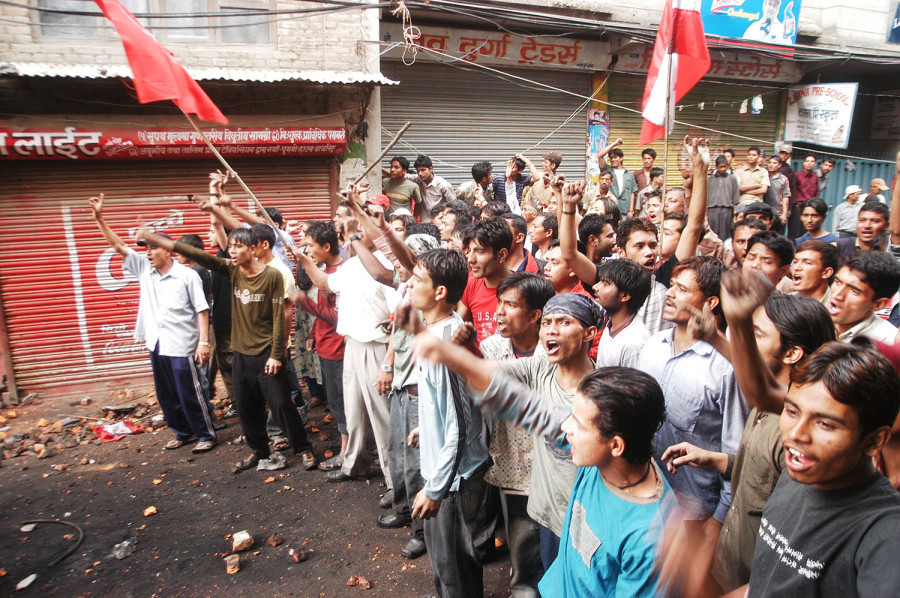Columns
Ghosts of Panchayat and angry young Nepal
Young Nepalis can be restless and angry but shouldn’t invite political regression.
Anurag Acharya
A decade back, when Nepal’s constitutional debate was at its peak, its development partners—who had been supporting the country’s delicate peace process—faced intense backlash. They had funded not one but two expensive Constituent Assembly elections, supported the government in de-commissioning the Maoist guerilla army, and generously provided reconstruction support in the aftermath of the devastating earthquake. Yet, the development aid was and continues to be blamed for Nepal’s failure to find a footing in governance and politics. There is a need to unpack this narrative, which is turning Nepal’s critical public discourse into a bitter echo chamber with no taste for nuanced conversation.
Nepal began receiving sizable development aid in the 1960s, during the onset of the Cold War. The United States’ aid for setting up Nepal’s telecommunications network, India’s infrastructure support to build highways, airports and hospitals, as well as Chinese and Russian assistance to establish industries in Tarai, were crucial to kick-start Nepal’s development that had been elusive due to the 104 years of Rana autocracy. The aid came with Cold War geopolitics, but Nepal’s development needs outweighed the risks of geopolitical miscalculations, which continues to be the case.
With the end of the Cold War, the nature of aid flow and management changed. However, Nepal stayed the course in terms of investment in physical and social infrastructures. Accordingly, building public schools, roads, health posts and hospitals, water and sanitation facilities and irrigation systems became central to development partners’ rural development support in the 1990s. Multilateral development partners, including the Asian Development Bank and the World Bank, were especially willing to support the government’s ambitious infrastructure undertakings like the Melamchi drinking water project and the Arun III hydroelectricity project. However, the development pursuit was interrupted when the country entered a decade-long armed conflict and a protracted political transition.
It was not until 2015, when the country promulgated its new constitution, that the government and the development partners joined hands to support Nepal’s economy. However, given the devolved political and administrative structures, much of the support for the next few years was devoted to institutionalising federated structures. Supporting sub-national governments at the provinces and the municipal levels to find their technical footing in managing state affairs became a priority.
If the current capacity of provinces and the local governments to manage resources and ensure inclusive governance is laid bare before common Nepalis, no questions would be directed at the development partners regarding their continued support for Nepal’s federalisation process. Donald Trump sitting in his Oval Office may not see its rationale, but if Nepal’s self-inducted public intellectuals don’t see its need, they must step outside Kathmandu’s echo chamber.
Trump’s domestic cheerleaders
One of the finest adages on modern-day political realism comes from an ancient Greek historian, who famously stated, “The strong do what they can and the weak are destined to suffer what they must”. The US President’s decision to obliterate the most powerful development agency may have been triggered by his domestic political calculations, but it has had far-reaching consequences across the globe.
The US retreat has left a sizable budgetary void in a post-conflict society like Nepal, which does not have a strong domestic revenue source. Some of the largest USAID spending in Nepal had been supporting Nepal’s health, education and agriculture sectors along with technical help for Nepal’s federalisation process. Dozens of crucial government works like immunisation campaigns, child and maternal health programmes, public education and enrollment support programmes, agriculture and market development initiatives and climate-resilient farming practices received partial or full aid.
Even a temporary disruption of monetary flow could seriously undermine Nepal’s crucial gains in child and maternity health and primary and secondary education. So, those who cheerlead for Trump’s actions should first present the full picture of the collateral damage to their supporters.
A section of Nepal’s media and civil society believes that targeting development partners would discourage them from supporting the country’s federalisation process and inclusion policies. Depending upon their ethnic and political orientation, many of them have either benefitted from the previous political dispensation under the monarch or have deep insecurity or hate towards politically marginalised ethnic communities. Therefore, their allegations of inefficiencies and malfeasance, expected within any political system in transition, are simply an excuse to rabble-rouse the young and restless population into an insurrection.
The ghosts of the Panchayat are simply exploiting the failures of Nepal’s education system—its inability to impart critical lessons on political history to the younger generation, especially about our struggles for freedom and democracy under the Panchayat and King Gyanendra Shah’s authoritarian rule.
Young, unemployed and angry
As is the case everywhere in the developing world, there is a mismatch between public expectations and the pace of our transitioning state to deliver. Moreover, the young, under-employed Nepal is growing increasingly impatient with every electoral cycle.
Despite the challenges, my limited understanding of this country gives me sufficient conviction that Nepalis may not be satisfied with day-to-day politics and state delivery, but they will stand by and protect the political gains they have fought so hard for.
The recent public opinion surveys provide grounds for such a conviction. There is no denying that Nepal’s devolved administration has yet to function efficiently. The political leadership in Kathmandu are still reluctant to concede power to provincial leaders and pave the way for a genuine federalisation process within the party structures. Their insistence on concentrating power and resources in Kathmandu, against the spirit of the constitution, is perhaps the biggest reason for festering corruption and abuse of power across Nepal’s political system.
Sadly, political parties and their senior leaders, the champions of Nepal’s democracy, in their struggle against the dynastic autocracy, are becoming a big question mark rather than an answer to Nepal’s development aspirations. But the decaying relics of Panchayat autocracy, the loyal subjects of Gyanendra Shah, are plotting an unlikely revival by riding on the national discontent against the septuagenarian leaders.
Never mind that Shah isn’t exactly the youthful visionary his loyal subjects are selling him to be. The day Nepal’s restless and angry young population actually look for a political alternative, they will focus their energy on demanding accountability from the political parties rather than seeking out a saviour. Millions of Nepalis who have migrated abroad for a better future will return to take over the country, only grateful for the support its development partners have extended for decades.
The troika of Oli, Deuba and Dahal may be unwilling to hand over the batons inside their respective parties, but the free spirit of Generation Z is already taking over the streets of this country. If necessary, they should force the political bosses to abdicate their thrones—much like how the millennials of this country forced Shah out of power in 2006-07. But, they should never allow sovereign citizens of this country to turn into loyal subjects. The ghosts of Panchayat can twist and turn in their graves, as much as they like.




 8.26°C Kathmandu
8.26°C Kathmandu















